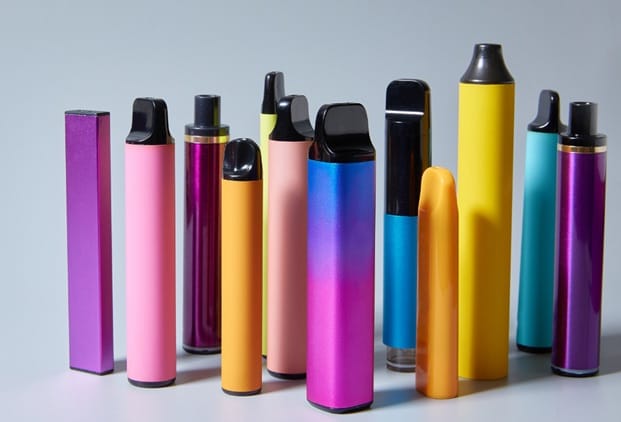
The government has announced plans to prohibit disposable vapes in order to address the growing trend of young people adopting vaping.
Steps will also be taken to ensure that vapes are not marketed towards children and to address sales to minors.
Prime Minister Rishi Sunak indicated that individuals who are looking to quit smoking would continue to have access to alternative options such as vapes, according to the proposals.
The ban is set to be implemented nationwide, according to the government’s announcement.
The government has expressed concern over the increasing popularity of disposable vapes among young people, as they are seen as a significant factor contributing to the rise in youth vaping. While it is currently against the law to sell any vape to individuals under 18, disposable vapes, with their attractive and compact packaging, seem to be particularly appealing to this demographic.
According to data from the Action on Smoking and Health (Ash) charity, there has been a significant increase in the number of 11 to 17-year-olds who vape regularly or occasionally. The figures have risen from 4.1% in 2020 to 7.6%.
Mr. Sunak declared on Monday that it was imperative to take decisive measures to eliminate the prevalence of vaping among children.
“It is concerning that children are engaging in vaping, as we aim to prevent addiction and fully comprehend the potential long-term health consequences,” he expressed.
‘Maintain vapes for adult smokers’
According to Mr Sunak, the proposals aim to find a suitable compromise between limiting access for children and ensuring that adult smokers can still access the necessary resources to quit smoking.
“It is crucial that we prioritise the availability of vapes for adult smokers who are seeking to quit,” the Prime Minister emphasised, expressing his commitment to addressing measures that prevent children from accessing vapes.”
According to the NHS, vaping is considered to be significantly less harmful than smoking. However, due to its relatively short existence, the long-term risks associated with vaping are not yet fully understood.
The vapour that is inhaled may still contain trace amounts of chemicals found in cigarettes, including nicotine. While nicotine is addictive, it is not considered one of the most problematic ingredients in cigarettes by the NHS.
The proposals come after last year’s announcement of a ban on selling cigarettes to individuals born on or after 1 January 2009, as part of an effort to establish a generation free from smoking.
During an interview with the BBC, Health Secretary Victoria Atkins expressed her optimism that the new bill would successfully navigate through Parliament before the upcoming general election, which is anticipated to take place this year. She further mentioned that the bill is projected to be implemented in early 2025.
Once the timing is confirmed, retailers will have a six-month window to implement the changes.
The bill could potentially be implemented through the use of current legislation aimed at safeguarding the environment.
Many activists have consistently voiced concerns about the environmental impact of disposable vapes and the challenges associated with their proper disposal, including the materials and chemicals used in their production, such as lithium batteries.
The latest updates would also implement measures to prevent the sale of refillable vapes in flavours targeted towards children and mandate that they be packaged in simpler, less enticing designs.

Shops will be required to keep refillable vapes hidden from children and separate from other items, such as sweets, as per government regulations.
The government has announced that there will be another public consultation to determine the flavours that will be prohibited and the regulations surrounding the sale of refillable vapes.
In an effort to curb the sale of vapes to minors, shops in England and Wales that are found guilty of illegally selling these products to children will face increased fines.
Matt Carpenter, head teacher at Baxter College in Kidderminster, expressed his views on the prevalence of vaping among young people. He believes that the proposed ban on disposable vapes is a significant development in addressing this issue.
Glyn Potts, head teacher at Newham Catholic College in Oldham, emphasised the importance of addressing the issue of children being exposed to enticing products on social media and in stores nationwide. He highlighted the need for action to protect children from this constant bombardment.
In an interview with BBC Radio 4’s Today programme, he raised concerns about certain vape pens being modified to include “cannabis derivatives,” potentially posing a risk to the health of young individuals.
Children will no longer have access to vaping alternatives such as nicotine pouches, which are small white pouches placed between the lip and gum. The pouches release nicotine but do not contain tobacco, so they can currently be legally sold to individuals under the age of 18.
Health leaders will be focused on ensuring that the new measures do not create additional barriers for adult smokers looking to transition to vaping as a potential alternative.
The consultation on the extent of restrictions on flavours and displays in shops will play a crucial role in shaping future decisions.
The announcement comes after a consultation initiated by the UK government and devolved administrations to assess public opinions on proposed measures to decrease smoking and vaping rates.
The government announced that a significant majority of respondents expressed their support for a ban on disposable vapes.
Are disposable vapes prohibited in other countries?
The Scottish and Welsh governments have expressed their intention to implement bans, either through legislation in their respective parliaments or by supporting measures across the UK.
Despite the ongoing absence of a devolved administration in Northern Ireland, the Department of Health has expressed its commitment to achieving a tobacco-free Northern Ireland. It is actively preparing for the arrival of new ministers who will have the opportunity to make a decision on the ban.
The UK has recently decided to join a select group of nations that are taking steps to prohibit the use of disposable vapes. Australia, France, Germany, and New Zealand have all made similar announcements, with New Zealand being the only country to have put their plans into action.
There are those who believe that the plans of the UK are still insufficient. There is a growing demand for e-cigarettes to be taxed similarly to tobacco products, and Australia has implemented a policy where vapes can only be obtained with a prescription.
An attempt born out of desperation
Deborah Arnott, the chief executive of Ash, expressed her approval of the government’s strategy. Dr. Camilla Kingdon, the president of the Royal College of Paediatrics and Child Health, emphasised the importance of creating a “smoke-free generation” to decrease the likelihood of young individuals developing preventable diseases in the future.
The announcement has left the UK Vaping Industry Association feeling “dismayed”. They expressed their disappointment, stating that disposable vapes have been instrumental in assisting countless adults in quitting smoking and remaining smoke-free.
The statement emphasised the need for stricter enforcement of existing laws, characterising the suggestions as a “last-ditch effort by the government to prioritise political gain over the well-being of vapers.” It warned that these proposals could heighten the danger to children by fueling the growth of the illegal market.
Elf Bar, a prominent vape manufacturer along with its sister brand Lost Mary, has voiced its support for the government’s efforts to prevent children from using vapes. However, the company expressed its disappointment regarding the decision to implement an outright ban.
The UK division of British American Tobacco, which is one of the leading companies in the disposable market, proposed that implementing stricter measures on “importation, appeal, and access” would be a more effective way to decrease the use of their products by underage individuals.
Shares in several prominent vaping companies experienced a significant decline during early trading on Monday.
Trading Standards officers are calling for additional resources and time to effectively combat unscrupulous retailers.
Local authorities have the power to impose a hefty fine of up to £2,500, while the government has recently unveiled a substantial £30m package to bolster enforcement efforts.
Meanwhile, the government’s proposed ban on the sale of tobacco products to people born on or after 1 January 2009 has faced criticism from former Prime Minister Liz Truss. She described it as “profoundly unconservative.”
She strongly criticised the idea of expanding government control and supporting efforts to restrict personal choices.





More Stories
THE CITY WITHOUT LAWS IS SLAB CITY
An image of a Wild Orangutan Using a Herb to Cure his Wound
Meet the richest Family in the World, who Possess 700 Cars and Live in a $478 Million Home